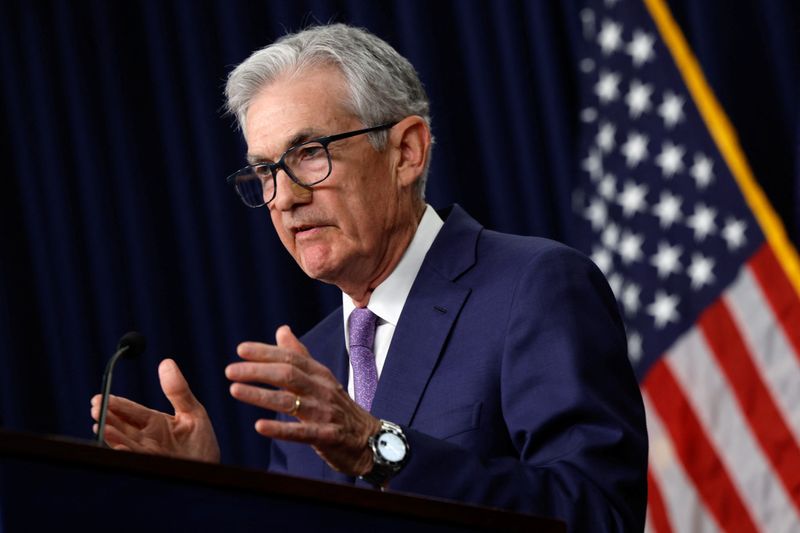Investing.com -- The Federal Reserve on Thursday reduced its benchmark interest rate by 25 basis points, as widely anticipated, moving it to a new range of 4.50% to 4.75%. This adjustment will modestly ease borrowing costs on credit cards, loans, and auto financing.
The recent cut follows a larger 50-basis-point reduction in September, which had already brought rates down from the year’s high of 5.25% to 5.50%.
The Fed initiated this rate-cutting cycle in September to stimulate economic growth amid moderating inflation and a softening labor market. Prior to these cuts, the central bank spent two years raising rates to contain inflation, which had peaked at 9.1% in June 2022. Since then, inflation has moderated to 2.4%, drawing it closer to the Fed's 2% target.
At a press briefing, when asked about how Trump’s election might influence future Fed policy, Chair Jerome Powell stated that "in the near term, the election will have no effects on our (interest rate) decisions."
Powell also addressed whether he would step down if requested by Trump, responding, "No." With a year left in his second four-year term as chair when Trump is due to take office, Powell added that, in his view, Trump lacks the authority to fire or demote him, saying it would “not be permitted under the law.”
In remarks last September, Powell suggested that another 25-basis-point rate reduction could be on the table before 2025, provided economic trends stay on their current path. However, on Thursday, he refrained from committing to any further moves, leaving open the possibility of a quarter-point cut in December and the four cuts policymakers have projected for 2025.
He stated that the Fed will keep analyzing economic data to determine the “pace and destination” of interest rate adjustments, as policymakers work to recalibrate the current restrictive monetary policy. This shift reflects the significant slowdown in inflation over the past year, now approaching the Fed’s 2% target.
But as policy initiatives from the incoming administration start to materialize, Powell noted that the Fed will begin evaluating their potential effects on its dual mandates: stable inflation and maximum employment.
What Wall Street strategists said after FOMC Meeting
After the Fed's meeting and Jerome Powell's speech, several Wall Street firms offered their views on the likely direction of monetary policy going forward.
Citi: “Powell reminded markets that the Fed mandate is full employment and stable prices and even if GDP growth runs stronger-than-expected, policy rates will still remain on a path toward neutral.”
“The message was dovish relative to recently-more-hawkish market pricing and we continue to expect further rate cuts at each upcoming meeting. A pause in December is unlikely. A 50bp rate cut in December is likely if the November jobs report confirms the labor market is softening faster than Fed officials and consensus expects.”
Morgan Stanley (NYSE:MS): “Chair Powell's comments are consistent with our forecast for continued 25bp cuts. The Committee is still confident in the downward path of inflation and is aware of base effects and residual seasonality affecting upcoming prints. The overall tone was even handed - they view risks to employment and inflation as balanced and policy as still restrictive. They are moving towards neutral but not in a rush.”
Macquarie: “Our base case remains for a further 25 bps cut in December. Beyond this, the timing and pace of further cuts has become uncertain. We suspect that in December the committee rate projections (the dots) may shift somewhat hawkishly, reflecting reduced downside risks relative to what had appeared to be the case at September's meeting.”
Nomura: “We continue to expect 25bp rate cuts in December and March, with a skip in January. We anticipate tariff-driven inflation by mid-2025 will lead to a prolonged pause in the Fed’s easing cycle.”
Bank of America (NYSE:BAC): “Chair Powell emphasized that the Fed was on a steady course to continue lowering rates towards a neutral level. That means another December cut is likely, as expected by the market.”
